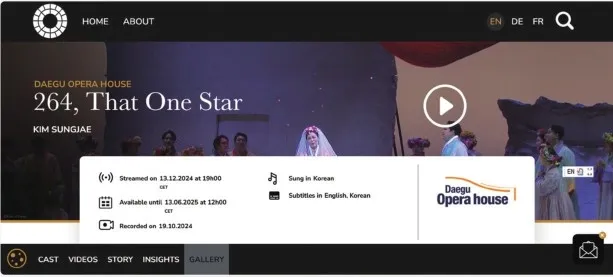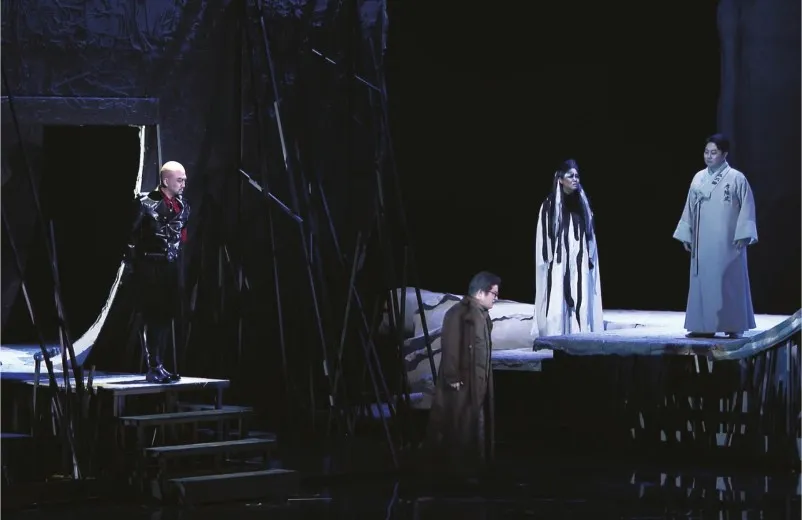通过线上分享的原创韩国歌剧
2025-01-31
小琼:我花了整个年末假期,像追剧般在线观看各类文化节目!没有什么比拥有几天属于自己的时间,在舒适的家中挑选最好的歌剧来观看更美好的事了!
小薇:事实上,中国的国家大剧院已经面向全国上传了一个免费的视频库,节目种类丰富,从歌剧、舞剧到音乐会,数百小时的高品质演出触手可及。
小琼:我刚刚从几年前我在本专栏中提到过的一个熟悉的网站上有所发现。还记得“歌剧视野”吗?
小薇:那是由欧盟“创意欧洲计划”资助的、由专注于欧洲歌剧院和艺术节的专业协会机构Opera Europa建立的免费流媒体平台。这个网站提供了许多来自其成员机构的歌剧和芭蕾舞剧视频。
小琼:不仅限于此。他们偶尔还会提供欧洲以外的歌剧院的节目!不久前东京新国立剧场在该网站上分享了日本歌剧与舞剧制作,目前是大邱歌剧院制作的《264:一颗星》。这部由金成宰作曲的剧目将持续上线到今年6月中旬。
小薇:多么不寻常的标题……这是一部怎样的作品?

小琼:这是一部用韩语演唱的原创歌剧,讲述了他们的革命英雄李源禄(1904—1944)的一生。李源禄是一位韩国诗人和爱国者,在20世纪初与日本侵略者进行了斗争。在很多方面,我可以看到这部歌剧的主题与不少近期制作的中国原创及民族歌剧之间的相似之处。它们突出了国家历史上的重要时刻,并激励了本国民众。
小薇:1944年,李源禄死于日本侵略者的酷刑之下,那正是一个世界历史的动荡时期。但在演员名单上,我看到主角李源禄由多达三名的演员分饰。多么有趣的艺术设计啊!
小琼:两位男高音歌唱家分别饰演“士兵”李源禄和“丈夫”李源禄,一位男中音歌唱家饰演“诗人”李源禄。作品对李源禄自身及他的行为和信念进行更深入的心理研究,但它也有助于有效地讲故事,方便编剧运用回忆和快进时适应倒叙的手法。
小薇:我快速浏览了一下这段歌剧视频。演唱和管弦乐演奏的质量都非常高。当我在春节假期有更多时间的时候,我会看完整部歌剧!

Joan: I spent the holidays catching up on many cultural offerings that are available to watch online! Nothing beats having a few days to yourself, picking the best operas to watch in the comfort of your own home!
Valery: Indeed, China’s National Centre for the Performing Arts (NCPA) has already produced such a treasure trove of free videos, from operas and dance dramas to concerts for everyone in the country. Hundreds of hours of high-quality performances are easily reachable on the tips of our fingers.
Joan: I just made a discovery from a familiar website I’d mentioned in this column several years ago. Remember OperaVision?
Valery: That’s the free streaming platform funded by the European Union’s Creative Europe program (www. operavision.eu) and established by Opera Europa, the professional association of European opera houses and festivals. This website offers so many opera and ballet productions from its member institutions.
Joan: But there’s more. Once in a while they offer programs from opera houses outside of Europe! Not long ago, the New National Theatre Tokyo shared its productions on the website, and currently is Daegu Opera House’s 264, That One Star by composer Kim Sungjae, which is running until the middle of June.
Valery: What an unusual title…what is it about?
Joan: It’s a national opera—sung in Korean—tracing the life of their revolutionary hero Yi Won-rok(1904?1944), a poet and patriot who fought against the Japanese occupiers in the early part of the 20th century. In many ways, I can see similarities between the subject of this opera and recent Chinese national operas. They highlight important moments in history and inspire the audience.
Valery: Yi died under torture of the Japanese in 1944, a tumultuous period in world history. But on the cast list, I see the leading character—Yi Won-rok—is played by three actors. What an interesting artistic device!
Joan: Two tenors play Yi the soldier and Yi the husband, while a baritone plays him as a poet. It allows for a deeper psychological study of the man, his actions and his beliefs. But it also makes for effective storytelling, accommodating flashbacks as the story rewinds and fast-forwards the narrative.
Valery: I’ve had a quick look at this opera video. The quality of the singing as well as orchestral playing is very high. When I have more time during Spring Festival, I’ll watch the entire opera!
